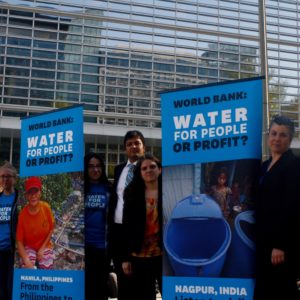Photo: Corporate Accountability created a visible, powerful splash at the World Bank Spring meetings.
When more than a hundred women showed up at the house of the governor of Lagos, Nigeria, their signs and chants sent a clear message: They would not stand by while privatization undermined their human right to water. That’s the same message that people like you and I around the world have been bringing to the World Bank, the behemoth engine behind water privatization.
And, writing this from having just returned from the World Bank Spring Annual Meetings, I’m happy to report that this message is sinking in and taking hold. Two recent developments illustrate this vividly.
First we recently learned that, after spending decades laying the groundwork for privatization in Lagos, the World Bank dropped its efforts to push a public-private partnership (PPP) project in Lagos. (See here for how PPPs and privatization are one and the same. I think this sign from Lagos women’s rally says it all: “PPPs — people in poverty paying more.”)
Then, on Tuesday — right as the World Bank was kicking off its Spring Annual meetings – an influential member of U.S. Congress called on the World Bank to stop promoting water privatization around the world.
Together, these events show that we are winning. We are making water privatization a costly and increasingly toxic endeavor for the World Bank.
World Bank abandons Lagos project
We recently confirmed that the World Bank has abandoned its efforts to secure a PPP contract as part of its ongoing loan in Lagos. This comes just about a year and a half after we joined our allies at Environmental Rights Action (ERA), to stop an impending water privatization scheme in Lagos.
The World Bank dropping the PPP effort is a major blow to global water corporations and to privatization proponents in Lagos. And, it provides tremendous momentum to the campaign to bring adequate public funding for a democratically controlled water system in Lagos.
The financial and reputational implications of this move are significant. The institution poured $7.5 million in its latest attempt to secure a PPP in Lagos. That is a lot of money, but it’s actually just the most recent installment in the hundreds of millions of dollars the World Bank has spent in the past decades gearing up to privatize Lagos’ water. Without a PPP contract backed by the World Bank, and with a powerful grassroots movement led by ERA opposing water privatization, the World Bank’s return on investment is looking pretty horrible.
Not only that, the World Bank was counting on turning Lagos into the latest false “success story” that would lead to a sweep of PPPs across the African continent. We have certainly put a wrench in that plan.
With our allies and members around the world, we’ve significantly raised the financial and reputational costs for the World Bank when it comes to promoting water privatization in Africa and around the globe.
Representative Moore calls out the World Bank
Meanwhile, we supported U.S. Representative Gwen Moore to put further pressure on the World Bank during the Spring Annual meetings: one of its most important public events. Moore is the Ranking Member on the House Financial Services Committee’s Monetary Policy and Trade Subcommittee — a committee with jurisdiction over the World Bank. This makes her one of the most influential members of Congress for World Bank leadership.
This week, Moore sent a letter to the president of the World Bank, demanding it “cease promoting and funding” water privatization, pending an independent review and congressional hearings on conflict of interest. Her action, backed every step of the way by Corporate Accountability and its members, made a huge media splash.
What does she mean by conflict of interest? Well, the World Bank promotes water privatization the world over (as it was doing in Lagos), by advising governments, producing and disseminating research, and funding privatization efforts. At the same time, its private lending arm (the International Finance Corporation) is part owner of water corporations that bid on the projects the World Bank supports. In playing all these roles, the World Bank is stacking the deck, dealing the cards, and placing all the bets on water privatization — a classic case of self-dealing.
For years, we’ve helped mobilize enormous grassroots pressure to challenge private water projects that threaten people’s access to water, like in Lagos. And for years, the World Bank has been trying to shut out the voices of the people on the ground. Now, Moore is amplifying those voices with a powerful voice from inside U.S. Congress, which controls funding from the World Bank’s largest shareholder, the United States.
As people across the United States are turning their attention to the issue of public water, people around the world are facing down the advance of water profiteers violating the human right to water. In this critical moment for our society, Corporate Accountability and our members are shining a bright light on the World Bank’s life-threatening support for water privatization. The win in Lagos and Moore’s bold actions brings us a huge step closer to upholding the human right to water everywhere.



